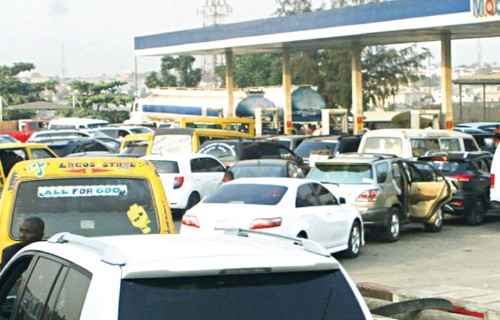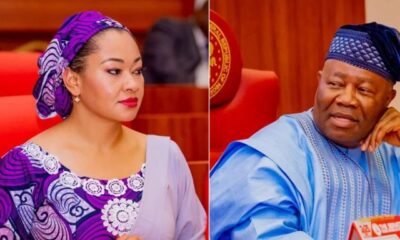Independent marketers of Premium Motor Spirit, popularly called petrol, are getting set to shut down operations beginning from Monday once the government starts the enforcement of N195/litre pump price.
It was gathered on Saturday that the Nigerian National Petroleum Company Limited, Major Oil Marketers Association of Nigeria, Depot and Petroleum Products Marketers Association of Nigeria, Independent Petroleum Marketers Association of Nigeria, security agencies and the downstream regulator had all agreed that petrol be sold at N195/litre.
Oil marketers said the agreement was reached at a meeting in Abuja on Tuesday, as participants resolved that beginning from Monday, February 6, 2023, the pump price of petrol should not exceed N195/litre, a development which dealers, particularly independent marketers, described as tough due to the high ex-depot price of the commodity.
They told our correspondent that to avoid having their outlets sanctioned, many filling stations operated by independent marketers would be shut from Monday as it made no business sense to sell a product lower than the cost price.
This is likely to further prolong the petrol scarcity and queues in many parts of the country as independent marketers control about 80 per cent of filling stations nationwide.
IPMAN’s National President, Debo Ahmed, told our correspondent that the approved ex-depot price of petrol was recently raised from N148/litre by the NNPCL to N172/litre, but depots hardly dispense the commodity at this cost.
Ahmed, who was reacting to the notice to members issued by the Public Relations Officer, IPMAN Ibadan Depot branch, Mojeed Adesope, stated that marketers were advised to sell the product in stock now before the enforcement begins on Monday.
In the memo, which was sighted on Saturday, Adesope said, “The top management of NNPC, other relevant authorities in the downstream sector of the economy as well as all the security agents in the country met at on Tuesday, January 31, 2023 to begin the enforcement of pump price of PMS at N195/litre at all the filling stations across the country with Immediate effect.
“Towards that end, enforcement will commence effective from Monday, February 6, 2023 to enable you to dispose of all your remaining stock on or before the enforcement date.
“Members are hereby implored not to purchase products that they would not be able to dispense at N195/litre. The above information should be given wider spread/circulation in order not to get any member caught unawares. You are strongly advised to heed this information.”
Commenting on this, the national president of IPMAN said the information was in order as he urged other independent marketers to take note.
Ahmed stated, “The information is in order, because the depots that the NNPC gives products to are selling at a higher price, and IPMAN members will not like to leave their stations idle. And to avoid sanctions, it is better to close your station.
“So what is going to happen in essence is that marketers have to buy products using the NNPCL loading tickets, and if they don’t have the tickets, all they have to do is to close down their stations. You have to buy from the NNPCL in order to sell at the government regulated price.”
He said the NNPCL was the only importer and it often gave the product to DAPPMAN to sell to IPMAN members at a regulated rate.
Ahmed added, “They also give the product to MOMAN to sell through the stations of major marketers, but DAPPMAN has to sell to independent marketers because independent marketers do not have depots.
“The 21 NNPCL depots across the country that we rely on before now are all moribund and not working. So right now, we depend on DAPPMAN depots to get our products at the price approved by the NNPCL.
“But most times, DAPPMAN would increase their price and when you buy from them at such a high price, there is no way you are going to sell at a lower price. So, that memo is telling marketers that if they cannot get the NNPCL product to buy at the controlled price, they better not sell to avoid having their stations sealed.”
When asked for the approved price that the government, through the NNPCL, had asked depot owners to sell, Ahmed replied, “In fact, there is a lot of confusion.
“As of today, we are supposed to buy at N172/litre from the NNPCL designated depots run by DAPPMAN. But if you get there at times, you don’t buy at that price; rather, you buy at higher rates.
“Before it was N148/litre, but all of a sudden, the NNPCL just did what it did and increased the price to N172/litre, which was why they said the retail price should now be N185/litre.”
He explained that the N172 ex-depot price was without the cost of conveying petrol to wherever the marketer was taking the product to.
“If you are taking it further than 400 kilometres from the place of purchase, you are going to get the bridging claims or price equalisation. But if you are taking it within 120 kilometres or around that distance, you will get some little allowance to make you sell at a controlled price.
“But, the truth is that we don’t get the product at the controlled price of N172, which is why you see a lot of areas where they sell at higher prices.
“However, for MOMAN, because they get it at the controlled price, they take it from their depots to their stations and sell it at lower prices compared to independent marketers. Mind you, independent marketers control about 80 percent of retail outlets in Nigeria.”
In Lagos, most of the outlets that sold the product on Saturday had long queues of desperate motorists, with some selling for between N280 and N350 per litre.
A similar situation was prevalent in Ogun State, where motorists struggled to get petrol from the few filling stations that had the product. Some stations on the Lagos-Ibadan Expressway sold the product for between N320 and N380 per litre.
A commercial motorist, Idris Adewale, said he had banked on getting petrol at the Nipco filling station at Magboro for N195 per litre, but was disappointed to discover that the station was under lock and key. He also claimed that the Rainoil station at Ibafo did not sell the product and he only succeeded in filling his vehicle’s tank before the Sagamu interchange for N340 per litre.
A desperate motorist, Nnamdi Goodman, claimed to have bought 10 litres for N7,000 on Airport Road in Lagos on Saturday.
“The situation is very serious now. I bought 10 litres of petrol from a black marketer on the Airport Road in Lagos on Saturday morning. That’s N700 per litre! I don’t think I can keep going like this, otherwise I will spend all my salary and savings on fuel alone,” he lamented.
In the Federal Capital Territory, many filling stations belonging to independent marketers were shut on Saturday due to lack of products to dispense, while the few ones that sold petrol dispensed it above N195/litre.
At the Khalif Civic Oil & Investment Limited filling station located in Kubwa, a suburb of Abuja, petrol was dispensed at N300/litre, while many others in obscure locations in the capital city sold above N300.
However, the few outlets of the major oil marketers and the NNPCL that sold petrol on Saturday dispensed it at the approved N195/litre pump price. But many mega stations were not open for business due to lack of products to sell.
Eterna, Gegu Oil, Sunset Energy and MRS, among others, located on the Kubwa-Zuba Expressway, were not selling the product.
Also, Major Oil filling station on Airport Road, and the NNPC filling station on Arab Road, Kubwa, did not dispense the product as they were all shut.
However, the queues in the few outlets such as Salbas around Zuba, and Conoil in the Central Business District were not too long as the preceding day due to the fact that most residents stayed indoors for the weekend.
On Thursday, the Chief Executive, Nigerian Midstream and Downstream Petroleum Regulatory Authority, Farouk Ahmed, and the Group Chief Executive Officer, NNPC Limited, Mele Kyari, disclosed that several measures were being taken to enforce the approved price of petrol and to stop the diversion of the product.
The NMDPRA boss, while speaking on sanctions against downstream operators who flouted the approved regulations, stated that over 270 filling stations and seven depots had been closed down.
“On top of shutting the depots, we also shut down over 270 retail outlets. We are doing our work and this has brought some respite in some areas,” Ahmed stated.
On his part, Kyari said the Federal Government was now deploying operatives of the Department of State Services to monitor tankers conveying petrol to filling stations in order to halt the diversion and smuggling of the product.
He stated that already, over 120 DSS officers had been deployed to follow fuel tankers to the various retail outlets in Abuja, as more security agencies were being drafted for the exercise for nationwide coverage.
“So much is going on; there are government security interventions. I know the kind of work that we do with the security agencies; for instance, in Abuja alone, we have over 120 DSS officers following every truck to fuel stations and we are activating this across the country,” Kyari said.
Meanwhile, the Chairman, IPMAN, Enugu Depot Community in charge of Anambra, Ebonyi and Enugu states, Mr Chinedu Anyaso, has said the prevailing shortage in the supply of PMS in the South-East may not end soon because of the challenges facing marketers in procuring the product.
He said this in an interview with the News Agency of Nigeria in Awka on Saturday.
NAN reports that petrol now sells for between N400 and N450 per litre and between N500 and N600 in the black market in Akwa, Anambra State.
As of Saturday, most filling stations in the city were closed for lack of petrol, while the few that had the product were selling at very high prices with long queues of motorists.
Anyaso said the quantity of the product coming to the South-East had reduced by more than 50 per cent compared to the supply in normal time.
According to him, at the moment, nothing suggests the easing of the problems as some of the marketers have yet to get supplies they paid for over a month ago, except the Federal Government takes a drastic action to flood the country with the product.
Anyaso stated, “Our members, who got NNPC allocation last year, paid for the product since December, up till now they have not received their supply; rather, they asked them to pay additional money for which most of them made overdraft of between N1.4m and N1.6m.
“As you can see, most filling stations in the zone have shut down because they can no longer source petrol normally, those that have, pay through their nose to get it; that is why there are abnormal rates because they have to recover their cost and make some profits.
“It is impossible for the authorities to enforce price now; our people are making extra effort to ensure that we have the product to buy even if it is expensive.”
Anyaso said in addition to the hardship the people were facing as a result of scarcity and high prices, thousands of workers stood to lose their jobs if the problems persisted as no marketer would continue to pay workers when they were not in business.

 BIG STORY3 days ago
BIG STORY3 days ago
 BIG STORY5 days ago
BIG STORY5 days ago
 BIG STORY3 days ago
BIG STORY3 days ago
 BIG STORY3 days ago
BIG STORY3 days ago
 BIG STORY5 days ago
BIG STORY5 days ago
 BIG STORY3 days ago
BIG STORY3 days ago
 BIG STORY5 days ago
BIG STORY5 days ago
 BIG STORY5 days ago
BIG STORY5 days ago
































